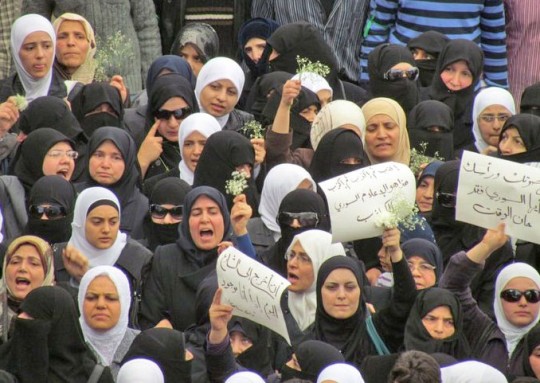Syrian crisis reaching stage of civil war, UN human rights chief says
Syrian crisis reaching stage of civil war, UN human rights chief says
 Syrian women protesting in May 2011
Syrian women protesting in May 2011
1 December 2011 – The deteriorating situation in Syria is now close to a civil war and the death toll from the nine-month crackdown by the country’s security forces against protesters has passed at least 4,000, the United Nations human rights chief said today.
Navi Pillay, the UN High Commissioner for Human Rights, told journalists in Geneva that 4,000 was a conservative estimate, with “the reliable information coming to us… that it’s much more than that.”
Ms. Pillay will address a special session tomorrow of the UN Human Rights Council, which is meeting in Geneva to discuss this week’s release of an independent international commission of inquiry into the crackdown.
That three-member commission, established by the Council, found evidence that Syria’s military and security forces have committed crimes against humanity since March, when a public uprising began across Syria, in line with similar movements across North Africa and the Middle East.
The commission’s report is based on interviews with more than 200 victims and witnesses of human rights violations, including civilians and defectors from the military and security forces.
Aside from its findings, the commission called on the Syrian Government to immediately end the ongoing rights violations, to initiate investigations of these incidents and to bring the perpetrators to justice.
Speaking today, Ms. Pillay warned that as more defectors threatened to take up arms, there is an increasing threat of “a civil war and at the moment that is how I am characterizing this.”
###
> United Nations (UN).
 The United Nations was established on 24 October 1945 by 51 countries committed to preserving peace through international cooperation and collective security. Today, nearly every nation in the world belongs to the UN: membership totals 192 countries.
The United Nations was established on 24 October 1945 by 51 countries committed to preserving peace through international cooperation and collective security. Today, nearly every nation in the world belongs to the UN: membership totals 192 countries.
When States become Members of the United Nations, they agree to accept the obligations of the UN Charter, an international treaty that sets out basic principles of international relations. According to the Charter, the UN has four purposes:
- to maintain international peace and security;
- to develop friendly relations among nations;
- to cooperate in solving international problems and in promoting respect for human rights;
- and to be a centre for harmonizing the actions of nations.
###
* The above story is adapted from materials provided by United Nations (UN)
** More information at United Nations (UN) 

















